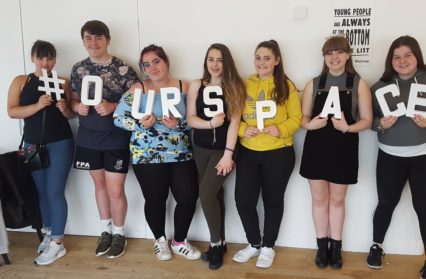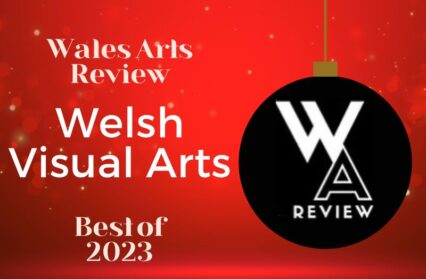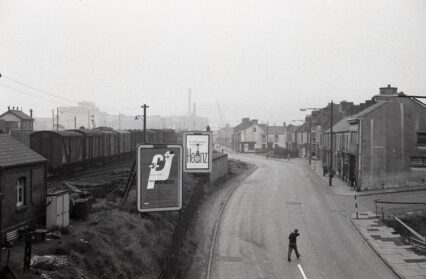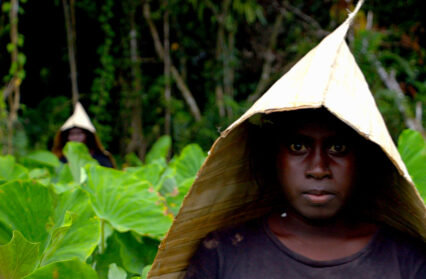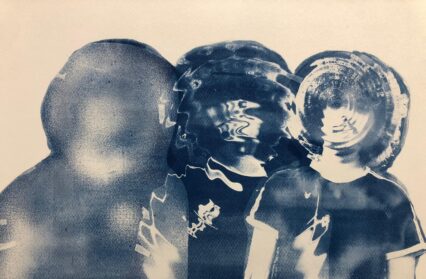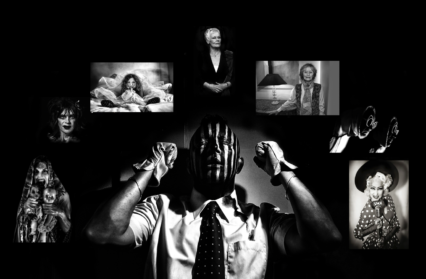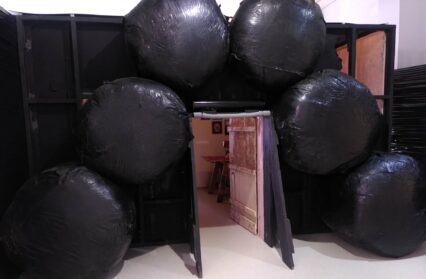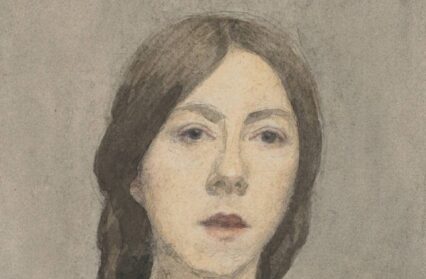Phil Morris was at London’s Tate Modern to see a series of performance installations from Valleys Kids, a remarkable charity that has changed the lives of thousands of individuals in ex-mining communities in the South Wales Valleys.
The metronomic tapping of a game of ping-pong cuts through the sultry summer air, while a teenage boy leans on his pool cue, listless and yawning, as an opponent sizes-up a banking shot. Girls laugh raucously as they play a card game in one corner of the youth club, while friendship bracelets are threaded in another. Instantly, the mood darkens, as hooded youths raise their angry voices and strike menacing poses – a pocket is picked, drugs are solicited, a child is threatened with a foot to the head. It is a set of grim tableaus, featuring disaffected youngsters of the south Wales valleys, already scarred by domestic violence, already failed by a resource-starved education system, and already consigned to a rudderless future of long-term unemployment, self-harm and petty crime. The harsh reality of thug life in the Rhondda? Well, not exactly, for this is a performance piece, in which a group of young artists from Rhydyfelin, with equal measures of artful playfulness and seething frustration, are confronting the negative images that have been projected onto them by those sitting on the opposite side of the age divide, and the more fortunate side of the economic divide.
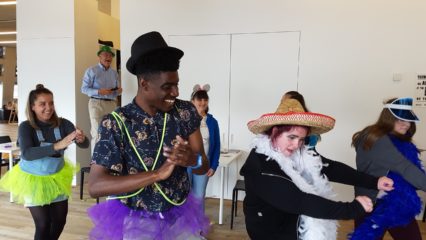
The contrast between the vital compulsion of these young people to be creative, expressive and socially engaged, and the prejudicial stereotypes of feral and nihilistic youth that they struggle against, is thrown into sharp relief by the juxtaposition of space, with the recently closed Rhydyfelin youth club temporarily resurrected within the hallowed halls of Tate Modern. It is yet another curious irony of our times that whereas austerity has closed a youth club that once provided refuge for generations of children in a Welsh village, the generous support of the estimable Tate Exchange programme (plus a travel grant from the Dulverton Trust), enables the warmth and fun of the club to be evoked again inside a cathedral of contemporary art in England’s capital.
Miranda Ballin, Artistic Director of Sparc – the arts strand of the Valleys Kids initiatives – says the inspiration for creating the Pop-up Youth Club came not from the understandable anger of the Rhydyfelin community, but from a spontaneous demonstration of public-mindedness by the young people who stood to lose most with the closure of the original club. “I heard they wanted to donate their ping-pong table. They couldn’t let it go to waste,” Miranda explains, “Even though they were devastated by the loss of their club, they were still thinking of others.” It was a small act of generosity that says a great deal about the values the club had helped to foster in its young members, who apparently understood much better than many of their elders how people gather and become communities in such spaces.
The Sparc team, which includes theatre leader Rachel Clement, facilitated the devising of the Pop-up Youth Club through workshops designed to derive content directly from the lives of its members. ‘Production’ was the over-arching theme of this year’s Tate Exchange exhibitions, inspired by artist Claire Twomey. Sparc decided to explore through their project the concept of ‘producing the Other’, in their case, how young people are being broadly stigmatised as feckless and criminal by a society that is not listening to them. As the tropes of teenage violence and drug taking are acted out, one of the performers, Bridie Evans, 17, exclaims; “This is what others think we do!”
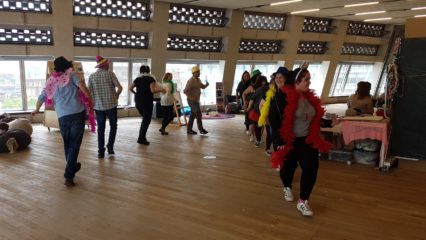
It becomes clear from a short documentary film screened as part of the performance, that the loss of the club to the youth of Rhydyfelin was particularly saddening because it was a place where they could escape the negative labels and misapprehensions that continue to dog them as they strive to establish individual identities for themselves. The club offered them a safe place in which they could play and be themselves. Rachel Clement recounts, “One of the performers told me that the club was somewhere she could come to forget.” Given the social problems endemic in communities across south Wales, especially after nearly a decade of austerity, it is unsurprising to learn that many of the Pop-up Club’s young creators are carers for a member of family and/or have experienced some form of domestic abuse. They refer to local schools as “pressure cookers” fixated on passing exams while their own more pressing concerns go ignored. Such circumstances inevitably lead to many children developing a range of mental illnesses. At their club in Rhydyfelin, young people were able to escape their problems and anxieties if only for a while, they could also draw strength from each other and seek advice from the much-loved and respected youth workers who worked there. As Adam Williams, 14, recalls fondly, “Erika and Claire were always there for us. If you ever had a problem you could always go to them.”
As the short film reaches its plaintive conclusion, dance music breaks out and the performers spring back to life. Some don party hats and feather boas and draw reluctant audience members into an impromptu conga line. Others engage the non-dancers with playground chatterboxes that elicit a series of questions regarding interviewees’ experiences of youth clubs and arts organisations. Two girls tie friendship bracelets on the arms of an elderly lady. It is the most potent of the afternoon’s many juxtapositions; joy in place of loss, generosity in place of waste, low-brow culture in place of high art. Superficially it all appears to be simply about kids being kids, all mucking about on a summer’s afternoon – which is no bad thing – but that is to underestimate the intelligence through which this combination of multimedia performance and art installation communicates its powerful message of communal values and the insistence of youth to define itself for itself. These young artists are children of the Valleys, but they are also the great-grand-children of Marcel Duchamp. While they may not have heard of Duchamp, the work they create is in the spirit of that arch-modernist who famously turned a urinal on its side in order to subvert society’s expectations and conventions. In that sense, the Rhydyfelin youth club found a true home in Tate Modern.
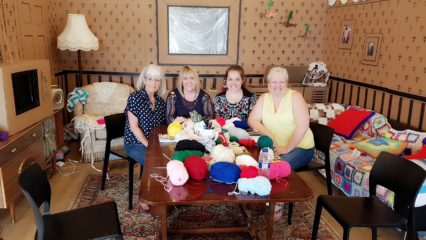
Valleys Kids brought a second installation/performance piece to Tate Exchange in the form of a Rhondda Front Room, conceived by artist-in-residence Anne Culverhouse Evans. This project featured continuous performances, each one lasting about an afternoon, enacting the everyday processes of crochet. In a room bedecked with artefacts from a typical miner’s home of the nineteen-fifties, but which would no doubt be found there as of today, members of the public were invited to sit and contribute to an ever-increasing crochet chain alongside members of a Rhondda arts and craft circle. As this material chain was being fashioned, a second non-material chain came into being, with each contributor starting to converse with those around them – that of memory and shared experience, reaching across generations and communities. This was another intelligent juxtaposition from Valleys Kids; with hundreds of millions of pounds worth of Picasso paintings and sculptures located one floor below, here was a quiet celebration of home-spun creativity. “We’ve been making this large, and getting larger, crochet chain against a backdrop of austerity,” Anne enthuses, “There’s now an imperative to home-make, upcycle and generate practical necessities that in themselves are also unique pieces of art.” It is a neat summation of the Valleys Kids projects at Tate Exchange – home-made artworks, created within the context of hard times, through which the neglected and overlooked are repurposed.
Since the closure of Rhydyfelin Youth Club, its members have started a campaign to raise awareness about the need for bespoke spaces where young people can create, share and spend time together in a safe space supported by skilled youth workers.
Should you want to raise this important issue with your MP and AM then get involved with the ongoing debate on social media using the hashtags – #OurSpace #LleNi
Or if you are interested in next steps, contact the Sparc Team via their website.
Image credits: Rachel Clement.
Phil Morris has also written more articles for Wales Arts Review about the closure of the Rhydyfelin Youth Club.


